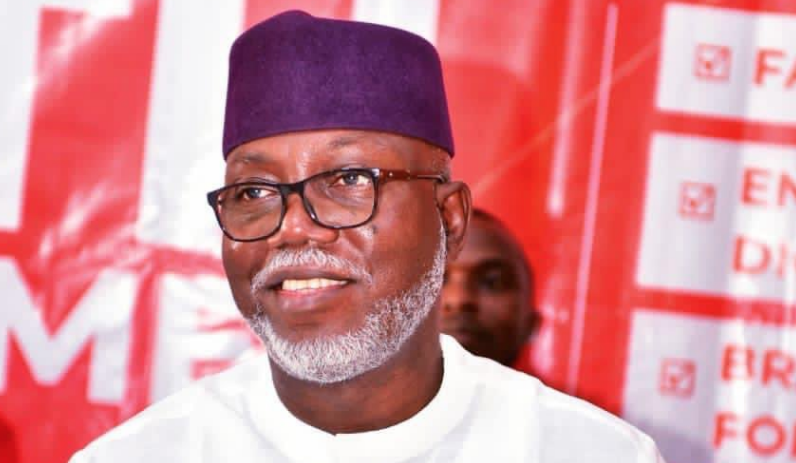
Southwest governors advocate state policing
Gov. Lucky Aiyedatiwa of Ondo has called for the establishment of state police in the country, to address the nation’s worsening security challenges.
The governor made the call at the 64th Annual General Conference of the Nigerian Bar Association (NBA) on Monday in Lagos.
The conference has the theme: “Is State Police a Solution to National Insecurity?”
Aiyedatiwa emphasised that state policing was essential to combat the evolving threats that had overwhelmed the centralised policing model.
“Today, it is with a heavy heart, yet resolute determination, that I stand before you to discuss a matter of utmost importance – Is State Police a Solution to National Insecurity?
”This theme brings to the fore, our collective inadequacies in not measuring up to the responsibility imposed by Section 14 (2) (b) of the 1999 Constitution.
”This section of the law provides that the security and welfare of the people shall be the primary purpose of government,” he said.
He, however, pointed out the limitations of the centralised policing system.
According to him, the centralised policing system has struggled to manage the complexities of modern security threats, like kidnappings, banditry, and terrorism.
He argued that these challenges necessitated local and community-based security solutions, tailored to the unique socio-cultural and environmental conditions of different regions.
“We require a decentralised security system that takes into account our diverse socio-cultural terrains and environmental peculiarities in the management of crimes.
“The centralised policing structure, once envisioned as the protector and servant of the people, has proven inadequate in the face of the complex and evolving security challenges of our time,” the governor said.
Highlighting as a beacon of hope, Aiyedatiwa praised the Western Nigeria Security Network, also known as the Amotekun Corps.
The Amotekun Corps is a regional security outfit, established under late Gov. Rotimi Akeredolu’s administration.
Speaking further, Aiyedatiwa lauded the Amotekun for restoring peace and security in Ondo and setting an example of what state policing could achieve nationwide.
The governor then urged Nigerians to envision a future where each state was empowered to tailor its security strategies, to the specific needs of its population.
“Imagine a Nigeria where every state is empowered to tailor its security approaches to the unique needs of its people.
“A country where swift response times, targeted intervention and community-driven initiatives become the norm, rather than the exception.
“This is the future we must fight for. A future where the safety and well-being of our citizens are paramount, protected by the very foundations of our constitution,” he said.
He acknowledged concerns about potential abuses, funding and political interference in state policing.
The governor however, expressed confidence that with the right safeguards and governance structures, state police could be a transformative solution for Nigeria’s security woes.
“Amotekun may not be a cure to all the deep-seated issues that plague our nation, but it is a good starting point, a bold experiment and a step in the right direction.
“We must also work toward a more comprehensive approach to security, one that addresses the root causes of insecurity, rather than merely treating the symptoms,” he said.
The governor paid tribute to his predecessor, the late Gov. Akeredolu, describing him as a “true visionary, whose unwavering commitment to the safety and security of the people, had continued to inspire them all.
On his part, Gov. Seyi Makinde of Oyo pledged strong support for the establishment of state policing in Nigeria.
Makinde was represented by a former Attorney General and Commissioner of Justice of the state, Prof. Oyelowo Oyewo (SAN).
The governor challenged the long-held myths surrounding the country’s centralised police system.
Makinde emphasised the urgency of adopting state policing, to tackle the rising insecurity across the nation.
He recalled the Southwest governors’ resolve to explore constitutional frameworks, that would enhance the creation of state policing.
He expressed concerns toward the concept of community policing, which was being promoted as an alternative by federal authorities.
“State policing may be an aspect of community policing, but it has a different character,” he argued.
He also dismissed the myth that policing must be conducted solely at the federal level.
The Oyo governor labelled it as a myth that was not borne out by data, statistics, or the reality of everyday life.
He argued that the fear of abuse of power by state governments was unfounded.
Makinde stated, “No scientific endeavour known, is free from abuse. If science was to think of abuse, we would not move on”.
Supporting Makinde’s stance, Rivers State Governor Siminalayi Fubara, expressed concerns about the limitations of the current federal policing system.
Fubara was represented by the Attorney General and Commissioner for Justice, Rivers State, Mr Dagogo Eborama.
He highlighted the inefficiencies in tackling crime across Nigeria, especially in states facing frequent kidnappings and other violent crimes.
He questioned the possibility of the central police in tackling crime effectively in the country.
On the contrary, Gov. Umar Namadi, of Jigawa. represented by the State Attorney General, Mr Bello Fanini, cautioned against the adoption of state policing, without careful consideration.
He advocated for a multi-layered police system that would allow state-level policing to complement the federal police.
“We still need the federal police because of the dynamics of crime,” he explained,
He emphasised the importance of synergy between state and federal forces.




